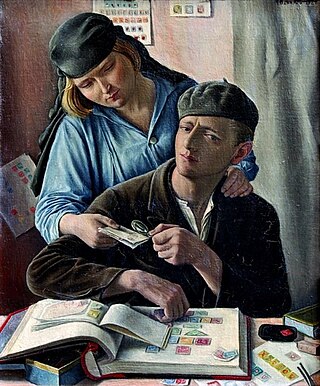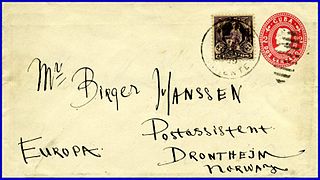
The topic of this article may not meet Wikipedia's general notability guideline .(January 2017) |
The Western Philatelic Library is located in Redwood City, California.

The topic of this article may not meet Wikipedia's general notability guideline .(January 2017) |
The Western Philatelic Library is located in Redwood City, California.
The library was founded in 1969 and is chapter 836 of the American Philatelic Society.
The library has been designated an official project of Save America's Treasures.
In 2014, the library moved to 3004 Spring Street in Redwood City.
The library is registered with the United States Internal Revenue Service as a 501(c)(3) non-profit corporation and donations are treated as a charitable deduction for the purposes of United States Federal Income Tax.
The library state on their website:
"The Western Philatelic Library exists to enhance the preservation and dissemination of philatelic knowledge by acquiring, organizing , interpreting and distributing information resources in a globally networked community.
Our Commitments:
As well as a general collection of philatelic literature, the library also contain several important historic collections, including part of the Hiram Edmund Deats library. Deats was born in New Jersey in 1870 and was a founding member of the American Philatelic Association which eventually became the American Philatelic Society. Deats was also the founding Librarian of the Collectors Club of New York.
Other special collections include the Tonga/Tin Can Mail Study Circle Library, the Society of Australasian Specialists/Oceania William H. Buckley Library which is the largest of its kind outside Australia and the Tannu Tuva Collectors Society Library.
2001 records list 13,000 books and pamphlets, 4000 bound volumes of journals, 2000 stamp catalogues, and 2000 auction catalogues in the library stock.
The library publishes a bi-monthly journal, The Bay Phil, which includes book reviews and other relevant content.

Philately is the study of postage stamps and postal history. It also refers to the collection and appreciation of stamps and other philatelic products. Philately involves more than just stamp collecting or the study of postage; it is possible to be a philatelist without owning any stamps. For instance, the stamps being studied may be very rare or reside only in museums.

Stamp collecting is the collecting of postage stamps and related objects. It is an area of philately, which is the study of stamps. It has been one of the world's most popular hobbies since the late nineteenth century with the rapid growth of the postal service, as a never-ending stream of new stamps was produced by countries that sought to advertise their distinctiveness through their stamps.

A cancellation is a postal marking applied on a postage stamp or postal stationery to deface the stamp and to prevent its reuse. Cancellations come in a huge variety of designs, shapes, sizes, and colors. Modern cancellations commonly include the date and post office location where the stamps were mailed, in addition to lines or bars designed to cover the stamp itself. The term "postmark" refers specifically to the part that contains the date and posting location, but the term is often used interchangeably with "cancellation" as it may serve that purpose. The portion of a cancellation that is designed to deface the stamp and does not contain writing is also called the "obliteration" or killer. Some stamps are issued pre-cancelled with a printed or stamped cancellation and do not need to have a cancellation added. Cancellations can affect the value of stamps to collectors, positively or negatively. Cancellations of some countries have been extensively studied by philatelists, and many stamp collectors and postal history collectors collect cancellations in addition to the stamps themselves.

Philatelic literature is written material relating to philately, primarily information about postage stamps and postal history.
The Scott catalogue of postage stamps, published by Scott Publishing Company, now a subsidiary of Amos Media, is updated annually and lists all the stamps of the world that its editors recognize as issued for postal purposes. It is published in fourteen large volumes that include twelve volumes containing all the countries of the world that have ever issued postage stamps, the United States Specialized Catalog, and the 1840–1940 Classic Specialized Catalogue. It is also produced in non-printable CD and DVD editions. The numbering system used by Scott to identify stamps is dominant among stamp collectors in the United States, Canada and Mexico.

A stamped envelope or postal stationery envelope (PSE) is an envelope with a printed or embossed indicium indicating the prepayment of postage. It is a form of postal stationery.

The Royal Philatelic Society London (RPSL) is the oldest philatelic society in the world. It was founded on 10 April 1869 as The Philatelic Society, London. The society runs a postal museum, the Spear Museum of Philatelic History, at its headquarters in the City of London.

L.N. and M. Williams were a philatelic writing partnership made up of brothers Leon Norman Williams and Maurice Williams (1905–1976).
The United States Stamp Society (USSS) is the largest philatelic organization dedicated to the research and study of United States postage and revenue stamps. The Society is a non-profit collector-based organization with a world-wide membership of over 1700. The USSS is Affiliate #150 of the American Philatelic Society (APS). Since 1930 the Society has encouraged philatelic study through voluntary membership in specialized committees, including those for specific stamp issues like the Washington-Franklins, the Prexies or the Liberty Series, and areas of U.S. philately such as Plate Numbers, Marginal Markings, Private Vending and Affixing Perforations, Booklets and Panes, and Luminescence. Research is made available through published books, research papers and articles in the monthly journal, The United States Specialist.

Walter Morley (1863-1936) was a pioneering English philatelist, stamp dealer and philatelic author.
Percival Stuart Bryce Rossiter was a renowned British philatelist and postal historian who wrote extensively about British postal history and postage stamps of British colonies in Africa and was involved in numerous philatelic institutions. In his Will he created The Stuart Rossiter Trust which has become a leading publisher of books on postal history.

The Roll of Distinguished Philatelists (RDP) is a philatelic award of international scale, created by the Philatelic Congress of Great Britain in 1921. The Roll consists of five pieces of parchment to which the signatories add their names.
Hiram Edmund Deats was an American philatelist, historian and publisher from Flemington, Hunterdon County, New Jersey. He was especially acclaimed for his collection of revenue stamps.
Society for Czechoslovak Philately (SCP) is a philatelic organization dedicated to the collection and study of the postage stamps and postal history of Czechoslovakia, the Czech Republic and Slovakia.
Charles James Phillips of London, England, and New York City, was a philatelist highly regarded in both England where he started his philatelic career and in the United States, where he emigrated to in 1922.

The Rocky Mountain Philatelic Library is a privately funded public library in Denver, Colorado.
Morton Dean Joyce (1900–1989), of New York City, was a philatelist who specialized in the collection of United States revenue stamps and became known by his philatelic friends as the "Dean of United States revenue collectors."

The Crawford Library is a library of early books about philately formed between 1898 and 1913 by James Lindsay, 26th Earl of Crawford. By the time of his death in 1913, Crawford was thought to have amassed the greatest philatelic library of his time. Today, the library is part of the British Library Philatelic Collections.
John Barefoot is a British philatelist, stamp dealer, and publisher, best known for his catalogues of revenue stamps which are known collectively as the "Barefoot catalogue".